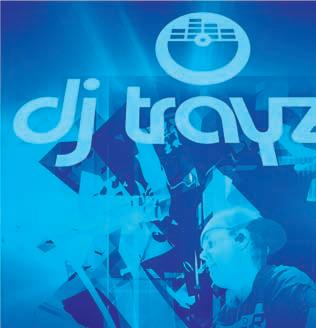
9 minute read
News
from Dec. 3, 2015
Hickey: Marijuana slows achievers
Washoe Assemblymember Pat Hickey has come out against the marijuana legalization measure that will appear on next year’s Nevada ballot.
Advertisement
In a prepared statement, Hickey—former Assembly Republican floor leader—said he took that stance in the interest of U.S. productivity after returning from a trip to Vietnam “where I witnessed firsthand the incredible strides our former enemy has made in overtaking America’s educational status in the world.”
Hickey took the position in his email newsletter. Quoting former Vanity Fair editor Tina Brown and California Gov. Jerry Brown, Hickey said pot and low achievement go hand in hand.
“It is true—and numerous studies show—that early marijuana use by adolescents is associated with lower educational attainment. Studies also show that regular pot use by teenagers results in higher high school drop-out rates (28 percent who do, 14 percent who don’t). Additional downer news for young stoner users—they do worse on college entrance exams and end up with lower IQs among adolescents.”
The 2016 measure achieved ballot status through an initiative petition.
Heller targeted
On Nov. 23, the League of Conservation Voters (LCV) began a Facebook ad campaign critical of U.S. Sen Dean Heller of Nevada.
The group’s grievance is Heller’s votes to kill the U.S. Environmental Protection Agency’s authority to limit the carbon pollution power plants can emit into the open air. The Facebook ad is targeted to Nevada, and will run for a week.
In a prepared statement, LCV president Gene Karpinski said Heller “voted to let big polluters continue dumping unlimited carbon pollution into our air, making it harder to breathe for the nearly half a million Nevadans who suffer from asthma.”
The Senate twice voted on Nov. 17 to strike the Obama administration’s climate change rules—just a few days before President Obama departed for the Paris climate talks. Senators voted 52-46 to stop carbon dioxide limits for existing power plants, which require a cut in carbon emissions of almost a third in the next decade and a half. A second vote did the same thing for future plants.
The embarrassment to the president was reduced by the fact that the measures did not pass by a veto-proof majority.
The Senate Republican leaders delayed a vote on anti-terror legislation to vote on the carbon resolutions. Three Republicans and three Democrats voted with the other side.
Plate planned
Anti-abortion license plates are on the way
The approval of the “Value life” plates, which will financially benefit the Women’s Resource Center of Southern Nevada, was voted by the Commission on Special License Plates at its Oct. 28 meeting, but has not been widely publicized.
There is already a slot available for the plates. Special plates are limited to a list of 30 topics. Openings appear as plates lose the minimum number to stay on the list. A “Second Amendment” plate approved by this year’s legislature will have to wait to move up five spaces on the list, according the Commission member Don Gustavson.
The commission approval came over a protest filed under the language of the special license plate statute that bars plates that “promote a specific religion, faith or antireligious belief.” An attempt to obtain minutes of the commission meeting was unsuccessful, but Gustavson said the plates won approval because they did not directly address abortion, only “life.”
Nearly half the states—most of them in the east and south— have abortion plates, and about half of those supply a portion of license fees to anti-abortion groups or pregnancy centers. In Nevada, abortion rights are protected by a 71.3 to 27.2 percent referendum vote in 1990 that approved a Roe-style state law and bars changes without another public vote.
—Dennis Myers
An unsurprising ruling
Court ruling takes down two-round elections
Reno city government and Gov. Brian Sandoval can’t say they weren’t warned. by Long before the U.S. Court Dennis Myers of Appeals for the Ninth Circuit ruled that Reno voters were being deprived of electoral power by the city election scheme, it was clear that the scheme was vulnerable to legal challenge. “That may cause the Department of Justice to look at the situation and say, ‘OK, maybe the system you have in place isn’t fair,’” Reno City Attorney John Kadlic said in May 2012, something he also told the Reno City Council.
The current system allows citywide voters to impose representatives on wards.
Read the Court of Appeals ruling at http:// tinyurl.com/jksyxs5
Kadlic also said the city would likely have to adopt ward elections sooner or later.
That was a year after Gov. Brian Sandoval vetoed a measure that would have let Renoites vote on having ward or citywide elections, and a year before he vetoed a second, similar measure.
Last week, the U.S. Court of Appeals for the Ninth Circuit overturned a Tucson municipal election system that is similar to systems used in Carson City, Henderson, Reno and Sparks.
Reno businesspeople have a long history of using election laws to shape the outcome of elections. During much of the 20th century, local bond elections could only be won if two separate tallies—of property-owning voters and nonproperty-owning voters—both produced majorities.
For a long time, Reno City Council elections were conducted citywide in both the primary and the general elections. That made running for office very expensive, reducing the ability of working people to run for the job, and the council was long dominated by business. Eventually candidates were allowed to run from wards, but only in primary elections—general elections were still conducted citywide. (The Reno system is slightly different than Carson City, Henderson and Sparks because it has one seat on the council that is elected citywide instead of representing a ward.)
Such systems also allow voters outside a ward to impose representatives on voters inside that ward. Nevada election officials were unable to immediately provide that kind of breakout for Reno, but the current Tucson City Council includes two members who were rejected by the wards they represent. Citywide majorities elected them.
“Ward 3 is a perfect example,” Kadlic told the RN&R in 2012.
City elections in four Nevada cities will likely undergo basic changes after a court ruling struck down crossbred balloting.
“It has 56.5 percent minority population. You could end up with a situation where a minority candidate wins in the primary, but loses in the general election—someone who wins in the ward but loses citywide.”
The Court of Appeals ruled that the primary and general elections are not separate elections. They are the first and second rounds of the same election, and the districts must be the same in both. In heavily Democratic Tucson, where the case originated, the system usually worked against Republicans. In Reno, it usually worked in favor of Republicans.
“Although Arizona as a whole generally votes Republican, Tucson generally votes Democratic,” the court ruling by Judge Alex Kozinski reads. “This means that the Democratic nominee from each ward will likely win the general election regardless of whether the ward from which he was nominated is principally Republican or Democratic. Indeed, the city’s current mayor and all six council members are Democrats. In most cases, then, the Democratic ward primary is the only election that matters. … Every otherwise eligible voter who will be a constituent of the sinner of the general election must have an equal opportunity to participate in each election cycle through which that candidate is selected.”
The court ruled that elections can be citywide or ward, but must be the same in both first- and second-round voting.
The majority ruling reflected two members of a three-judge panel of the Court of Appeals. In a dissent, Judge Richard Tallman flatly rejected the reasoning of the majority—“primary and general elections are not constitutionally equal.”
On a 5-0 vote, the Tucson City Council on Nov. 17 requested a full, 11-member Court of Appeals rehearing. Such rehearings are unusual. The council’s other alternatives were to drop the case or appeal to the U.S. Supreme Court. Paradoxically, the Ninth Circuit, often criticized for being too liberal, in this case came down on the side of Republicans.
Back in Nevada, the Reno City Council and the other municipal governments can now ask Sandoval to convene a special session of the legislature to amend the city charters. They or citizens can also go to court to seek orders striking down the current system. And the
councils can set in motion the amending processes for charters and ordinances. Rumors are flying in Reno that businesspeople will seek to have both first- and second-round votes be run citywide (“Left foot forward,” page 6).
Efforts to protect citywide elections have often featured less than worthy official behavior. In 2012, the Reno City Council agreed to put a non-binding measure on the ballot to let Renoites vote on whether to have ward or citywide elections. It set up a citizens committee to develop language for the ballot measure. The committee called for this question to appear on the ballot: “Shall the current method to elect the five ward city council members in the general election be changed to where each council member representing a ward must be elected by only the registered voters of the ward that he or she seeks to represent?”
The City Council overrode the recommendation and adopted language that effectively rigged the election by including language that suggested the status quo would be disrupted by a change: “Shall the five City Council members representing wards continue to be voted upon by all registered voters of the City in the General Election?” (Emphasis added.)
In addition, citizens who objected to the language at meetings of the city’s Charter Review Committee complained that the minutes of the committee’s meetings failed to reflect objections to the council’s language—and also failed to record the presence of some of those who spoke out.
At the time, Mayor Bob Cashell said, “No one except this small group is agitating for changes.” That may well have been true, but was kind of a so-what point. No one except a small group was agitating for the existing system, either. It simply wasn’t an issue that was on the radar of most Renoites.
The ruling also casts doubt on another Nevada law. That law allows the final election of a candidate to office in a party primary when candidates in only one party seek the office. As a result, voters in only a single party can participate in the election.
In 1998, for instance, three Republicans and no Democrats filed for the Washoe District 25 seat in the Nevada Assembly. Dawn Gibbons was elected to the post in the Republican primary, and general election voters never had an opportunity to vote on the race. A similar situation later developed in a Churchill County Commission race. Ω
Primary and general make up one election
Return visit
Democratic presidential candidate Hillary Clinton met with reporters at a Reno restaurant last week. Clinton, who won the Nevada caucuses in 2008, is flanked by her Nevada chair, Emmy Ruiz, who backed Barack Obama in that earlier race. The Nevada caucuses are the third-in-the-nation event, after the Iowa caucuses and the New Hampshire primary.















